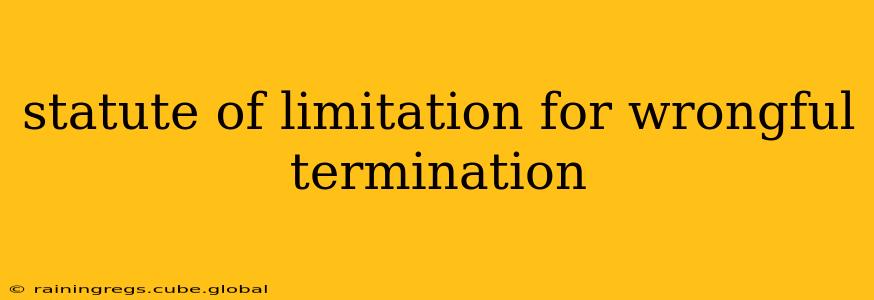Wrongful termination is a serious legal matter, leaving many employees wondering about their rights and the timeframe for taking action. Understanding the statute of limitations for wrongful termination is crucial for protecting your legal interests. This guide will explore the complexities of these limitations, providing a comprehensive overview to help you navigate this challenging situation.
The statute of limitations for wrongful termination varies significantly depending on several factors, making it impossible to give a single, universally applicable answer. The key factors include:
- The state or jurisdiction: Each state has its own laws governing employment, and these laws dictate the timeframe within which you can file a lawsuit. Some states have shorter limitations than others.
- The type of claim: The specific legal grounds for your wrongful termination claim will also impact the statute of limitations. For instance, claims based on discrimination often have different deadlines than those based on breach of contract.
- Federal versus state law: Some wrongful termination claims fall under federal law (e.g., Title VII claims for discrimination), while others are governed by state law. Each level of government has its own statute of limitations.
What is a Statute of Limitations?
A statute of limitations is a law that sets a maximum time limit for when legal proceedings may be initiated. After this time period expires, the ability to file a lawsuit is generally barred. This is designed to ensure that legal claims are brought forth while evidence is still fresh and readily available.
How Long Do I Have to File a Wrongful Termination Lawsuit?
Unfortunately, there's no single answer to this question. As mentioned, the timeframe depends heavily on the specifics of your case and the governing jurisdiction. However, common timeframes range from six months to six years. Some states have very specific statutes of limitations for specific types of claims, such as whistleblower protection, whereas others may be more general.
To determine the precise statute of limitations applicable to your situation, you must consult with an employment law attorney in your state. They can thoroughly review your case and advise you on the relevant laws and deadlines. Delaying legal action beyond the statute of limitations could permanently prevent you from pursuing your claim.
What Types of Wrongful Termination Claims Exist?
Several types of wrongful termination claims exist, each potentially having a different statute of limitations:
- Breach of Contract: If you had an employment contract that was wrongfully terminated, the statute of limitations usually follows the state's general contract laws.
- Wrongful Discharge in Violation of Public Policy: This occurs when an employee is terminated for refusing to commit an illegal act or for exercising a legal right.
- Discrimination (e.g., Age, Race, Gender, Religion, Disability): These claims are often governed by federal and/or state anti-discrimination laws, each with its own statute of limitations.
- Retaliation: If you were fired for reporting illegal activity or for participating in a protected activity (e.g., filing a workers' compensation claim), you may have a retaliation claim.
- Whistleblower Protection: Laws protecting whistleblowers often have specific statutes of limitations.
What Happens if I Miss the Deadline?
Missing the statute of limitations for your wrongful termination claim will likely bar you from pursuing legal action. The court will likely dismiss your case, preventing you from recovering damages. This is why consulting an employment lawyer as soon as possible after your termination is critical.
How Can I Find an Employment Lawyer?
Many resources can help you find an experienced employment lawyer in your area. You can:
- Search online: Use search engines like Google or legal directories to find employment law attorneys in your state.
- Ask for referrals: Contact friends, family, or colleagues who may have dealt with similar situations.
- Contact your state bar association: Your state bar association can provide referrals to qualified attorneys in your area.
Disclaimer: This information is for educational purposes only and is not legal advice. You should consult with an employment law attorney to get advice tailored to your specific situation and jurisdiction.
This article aims to provide a broad understanding of the complexities surrounding statutes of limitations for wrongful termination. Remember, seeking legal counsel is essential for navigating this process effectively and protecting your rights.
